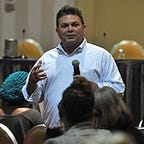The Science of Reading Trauma
NPR’s This American Life listens in as a student is assaulted by literacy instruction
Ira Glass: “But he has dyslexia. So reading an unfamiliar word, he has to decode it.”
Cassidy: “If it’s a big word that I’ve never seen before, like that word — I don’t know what that says.”
Ira Glass: “OK, let’s walk through that one.”
Cassidy: “Wait, deh, E. Deh, whip. Deh, eh, vu, ah.”
Ira Glass: “Here, talk me through what you’re doing. So you’re getting the deh.”
Cassidy: “Deh. I had to — if you didn’t — in the recording, you might hear me say “bed.”
Trauma in progress. As NPR’s Ira Glass watches, listens, and even interacts, “explicit” phoneme-based reading instruction (favored by “Science of Reading” advocates) is used to steal both time and literacy from a talented, curious 5th-grade kid who wants to get at what books (and other “written” stuff) have to offer.
Let’s be very clear about what we are watching. A child is trying to get to — a story, information, opinion — and, instead of an educational environment helping him gain…
